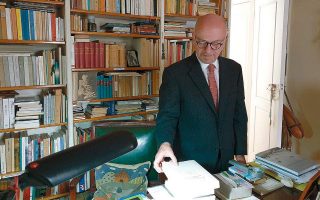‘Shakespeare wouldn’t have been surprised by the mob attack on the US Capitol,’ says scholar

How did the Bard predict Trump? In October 8, 2016, exactly one month before the US elections, Harvard professor Stephen Greenblatt, who is frequently described as the most important Shakespeare scholar alive, wrote an article in The New York Times titled “Shakespeare explains the 2016 election.” In the last four years many readers have returned to this article again and again.
Greenblatt has studied Shakespeare in such depth that he penned an article that “read” Donald Trump’s future trajectory with alarming precision. The article was an emergency appeal for more people to vote in the election so the ascension of Trump to the presidency would be averted. It was an appeal against what could be described as a repeat of what Shakespeare depicted in “Richard III.” In 15th century England the people’s consent offered the crown to Richard, who turned out to be an ugly, repressive tyrant.
Greenblatt explained in this article that Shakespeare wrote “Richard III,” one of his first big hits, in 1590 as a way to answer the question why nations, kingdoms and empires fall into the hands of extreme and unworthy leaders. As the centuries pass, the political ideologies might change but the meaning of power remains unchanged.
Shakespeare’s words, illuminating the fundamental truths, remain contemporary in every era. Greenblatt built on this article and in 2018 wrote the book “Tyrant: Shakespeare on Politics” (Bodley Head, Penguin, Random House UK), where the notion of the archetypal tyrant is completed with portraits of Macbeth and Henry VI, along with that of Richard III. After the shocking rampage of the pro-Trump mob at the Capitol on January 6, a development that seemed to defy any explanation because it took place in the capital of the most advanced and powerful democracy of today’s world, an interview with Greenblatt was deemed imperative as a way to make better sense of what really happened.
You had compared Trump with Richard III even before he was elected, warning people not to vote for him. Have you wondered whether history suggests that the “rise of Richards” from time to time is somehow an inevitability in human affairs?
Not an inevitability, I think, but an inescapable possibility. Shakespeare would have not have been in the least surprised by the mob’s attack on the Capitol. He was intensely aware of the possibility that unscrupulous demagogues would try to stir up the mass of discontented people by feeding them lies. There is a remarkable account of the way it works in one of his history plays, “Henry IV,” Part I, Act 5:
“These things indeed you have articulated,
Proclaimed at market-crosses, read in churches,
To face the garment of rebellion
With some fine color that may please the eye
Of fickle changelings and poor discontents,
Which gape and rub the elbow at the news
Of hurly-burly innovation:
And never yet did insurrection want
Such watercolors to impaint his cause;
Nor moody beggars, starving for a time
Of pell-mell havoc and confusion.”
By this account the principal agents of destruction are not the “poor discontents” who ransacked the offices on January 6, though they are likely to be the only ones who are jailed. The true perpetrators are those who delivered the mendacious speeches, filed the baseless lawsuits, and made the cynical parliamentary maneuvers in the service of the would-be autocrat’s grotesque lies.
Why do we consent to the rise of Richards and take pleasure “in the open speaking of the unspeakable” as you suggested in the article? Why are we charmed by every Richard’s “jaunty outrageousness”? Is it a form of social malaise? A collective “suicide wish”? Or is it simply opening a connection with our own dark side?
To consent to it on the stage, in daydream or in carnival, is one thing – Shakespeare is particularly brilliant at tapping into our desire to have a holiday from order and constraint. But to confuse fantasy with reality is a tyrant’s poisoned gift. I am charmed in the theater, but only in the theater, by the spectacle of Richard III; I am nauseated by the spectacle of Donald Trump.
Has Shakespeare ever prescribed a time-proven effective remedy for this?
There is no remedy apart from perpetual vigilance. The alternative, he feared, was civil war, in which everyone suffers.
Does the force and energy of a “Richard phenomenon” dissipate and disappear when the ruler falls or does it persist as many fear and have warned about?
Shakespeare is brilliant at staging not only the tyrant’s rise but also the collapse, often quite rapid – in “Richard III” (as in “Macbeth”) he shows the air escaping from the balloon. But he never thought it was final. After all, the actors will brush themselves off and play again tomorrow.





